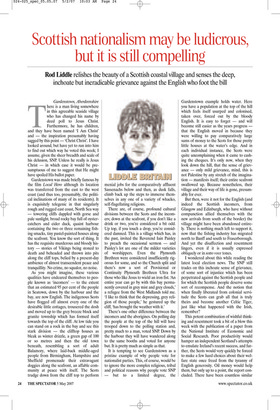Scottish nationalism may be ludicrous, but it is still compelling
Rod Liddle relishes the beauty of a Scottish coastal village and senses the deep, inchoate but ineradicable grievance against the English who foot the bill
Gardenstown, Aberdeenshire
There is a man living somewhere in this agreeable seaside village who has changed his name by deed poll to Jesus Christ. Furthermore, he has children, and they have been named ‘I Am Christ’ and — the inspiration presumably having sagged by this point — ‘Christ Christ’. I have looked around, but have yet to run into him to find out which way he voted this week; I assume, given the sheer breadth and scale of his delusion, SNP. Unless he really is Jesus Christ — in which case it would be presumptuous of me to suggest that He might have spoiled His ballot paper.
Gardenstown was made briefly famous by the film Local Hero although its location was transferred from the east to the west coast (and thus too, presumably, the political inclinations of many of its residents). It is exquisitely telegenic in that singularly rough and rugged east coast, North Sea way — towering cliffs dappled with gorse and pale sunlight, broad rocky bay full of oystercatchers and eider duck, quaint harbour containing the two or three remaining fishing smacks, tiny pastel-painted houses along the seafront. You know the sort of thing. It has the requisite murderous and bloody history — stories of Vikings being stoned to death and beheaded and thrown into pits along the cliff tops, belied by a present-day ambience of almost transcendent peace and tranquillity. No crime, no squalor, no noise.
As you might imagine, these various qualities have endeared themselves to people known as ‘incomers’ — to the extent that an estimated 95 per cent of the people in Seatown, down by the harbour and the bay, are now English. The indigenous Scots have flogged off almost every one of the desirable little cottages, trousered the dosh and moved up to the grey breeze block and granite township which has formed itself towards the top of the cliff. At low tide you can stand on a rock in the bay and see this stark division — the clifftop houses as bleak as winter drizzle, a green gap of 100 or so metres and then the old town beneath, resembling a sort of adult Balamory, where laid-back middle-aged people from Birmingham, Hampshire and Sheffield promenade their extravagant doggies along the seafront, an affable community at peace with itself. The Scots trudge down from the cliff top to perform menial jobs for the comparatively affluent Sassenachs below and then, as dusk falls, climb back up the steps to immerse themselves in any one of a variety of whacko, self-flagellating religions.
There are, of course, profound cultural divisions between the Scots and the incomers; down at the seafront, if you don’t like a drink or two, you’re considered a bit odd. Up top, if you touch a drop, you’re considered damned. This is a village which has, in the past, invited the Reverend Iain Paisley to preach the occasional sermon — and Paisley’s lot are one of the milder varieties of worshippers. Even the Plymouth Brethren were considered insufficiently rigorous for some, and so the Church split and there’s now a sort of Provisional or Continuity Plymouth Brethren Ultra for those who like Jesus to wield an iron fist. ‘An entire year can go by with this bay permanently covered in grey mist and grey clouds,’ a refugee from the West Midlands told me. ‘I like to think that the depressing, grey religion of those people,’ he gestured up the cliff, ‘has brought the weather with it.’ There’s one other difference between the incomers and the aborigines. On polling day the people at the top of the hill will have trooped down to the polling station and, pretty much to a man, voted SNP. Down by the harbour they will have wandered along to the same booths and voted for anyone but. It is pretty much as simple as that.
It is tempting to see Gardenstown as a pristine example of why people vote for nationalist parties. This, of course, would be to ignore the more complex religious, tribal and political reasons why people vote SNP — but to a limited degree, the Gardenstown example holds water. Here you have a population at the top of the hill which feels itself usurped and colonised, taken over, forced out by the bloody English. It is easy to forget — and will become still easier as the years progress that the English moved in because they were willing to pay comparatively large sums of money to the Scots for those pretty little houses at the water’s edge. And in each individual instance, the Scots were quite uncomplaining when it came to cashing the cheques. It’s only now, when they look down the hill, that the sense of grievance — only mild grievance, mind, this is not Palestine by any stretch of the imagination — manifests itself; their entire seafront swallowed up. Because nonetheless, their village and their way of life is gone, presumably for ever.
But then, were it not for the English (and indeed the Scottish incomers, from Glasgow and Edinburgh, who have without compunction allied themselves with the new arrivals from south of the border) the village might have been abandoned entirely. There is nothing much left to support it, now that the fishing industry has migrated north to Banff and south to Fraserborough. And yet the disaffection and resentment lingers, even if it is usually expressed obliquely or in sotto voce tones.
I wondered about this while reading the latest local election news. The SNP still trades on this inchoate sense of grievance, of some sort of injustice which has been perpetrated against the Scottish people and for which the Scottish people deserve some sort of recompense. And the notion that when finally liberated from colonial servitude the Scots can grab all that is truly theirs and become another Celtic Tiger, just like what happened with the Irish, remember?
This potent combination of wishful thinking and resentment took a bit of a blow this week with the publication of a paper from the National Institute of Economic and Social Research. Poor productivity would hamper an independent Scotland’s attempts to emulate Ireland’s recent success, and further, the Scots would very quickly be forced to make a few hard choices about their welfare state once freed from the tyranny of English generosity. Oil money would help them, but only up to a point, the report concluded. There have been countless similar reports in recent years, all of them airily shrugged off by the likes of Alex Salmond, dismissed in favour of a more primal and atavistic reasoning: no, we’d be OK if it wasn’t for them.
There was another broadside across the bows of the SNP in the Daily Telegraph this week. Andrew O’Hagan, a Scot, wrote a wonderful piece in which he damned the ‘mad anachronism’ of Scottish Nationalism. ‘The movement pretends not to resent England, though voters know that has always been part of its appeal. It pretends not to have been in league with England as Britannia ruled the waves ... [they] press their bad faith into service every time: as if we didn’t fight two world wars side by side with England; as if our Scottish Enlightenment didn’t happen after we formed the United Kingdom. The facts speak against the nationalists, but they don’t deal in facts because the facts have a tendency to bankrupt Scottish nationalism’s case before it gets going.’ And he describes how, as a Scot, he has lived his whole life ‘surrounded by the petulant noise of Scottish nationalism. It was a ludicrous sound in my childhood, a bit like the bagpipes, produced by wind and sentiment ... ’ Superb stuff. It is indeed a ludicrous and petulant sound, but — like the bagpipes it is still unaccountably compelling and probably rooted deep inside all of us since we developed self-consciousness: a mistrust of people who are not quite like ourselves and the easy recourse to blame them for our misfortunes.
Back in Gardenstown the summer season is approaching, and with it a muchneeded injection of cash brought by holidaymakers from all points south. The locals will be setting out their stalls for the strawberry festival, the excellent Harbour Restaurant is open again and serving steaming bowls of cullen skink and monkfish brochettes by the side of the quay. Soon these two disparate communities one at the top of the hill, the other at the bottom — can unite for a while, a fairly brief while, in shared resentment at the new incomers filling up the holiday lets behind the seafront. Grockles, they call the tourists disparagingly in Cornwall — another part of the UK which finds itself financially dependent upon people they affect not to like. I don’t know what they call them in Gardenstown.



































































































 Previous page
Previous page